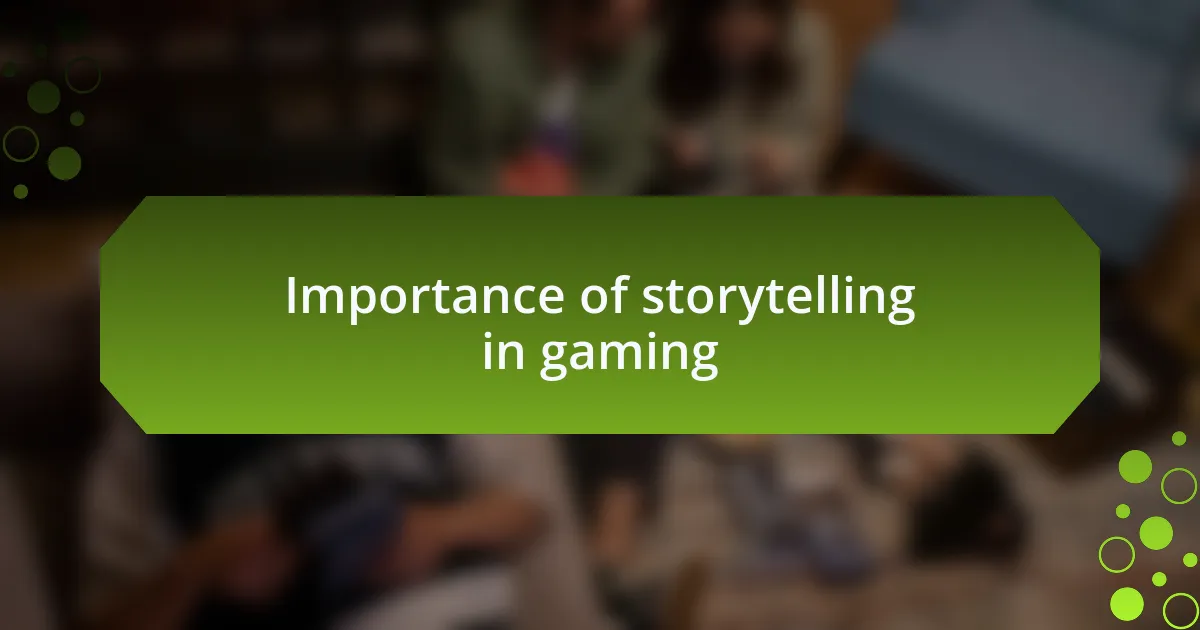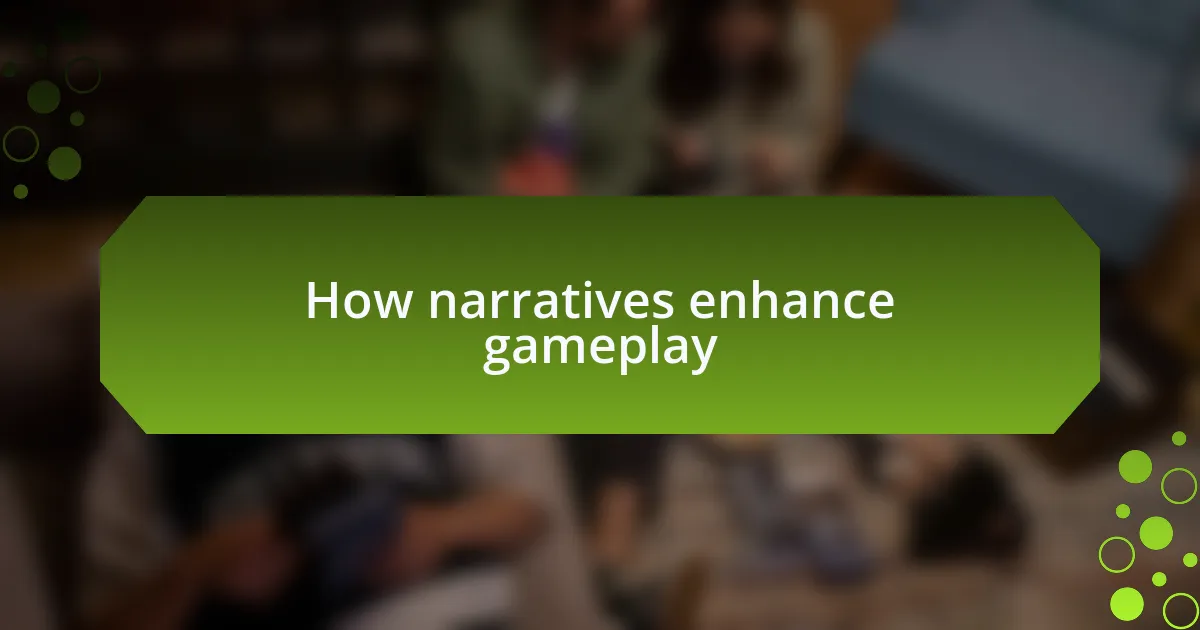Key takeaways:
- Video game narratives emphasize player agency and choices, often leading to profound emotional connections and introspection.
- Well-crafted storytelling transforms gameplay into memorable experiences, addressing complex themes and societal issues.
- Narratives enhance gameplay by making actions feel significant and immersive, creating a lasting impact on players.
- Future trends indicate a shift towards interactive storytelling and multimedia integration, allowing deeper emotional engagement and personal connections.

Understanding video game narratives
Video game narratives are fascinating because they often emphasize player agency and choice. For instance, I recall playing “The Witcher 3,” where my decisions significantly shaped the story. Did I ever stop and wonder how different the game would feel had I made other choices? It really immersed me in the narrative and made me reflect on the complexity of storytelling in gaming.
The emotional resonance in these narratives can be profound. I still remember the heartbreak I felt when a beloved character in “Final Fantasy VII” met an unexpected fate. It made me realize that just like in films, the connections we form with characters can deeply affect our gaming experience. How often do you remember the moments that tugged at your heartstrings while playing?
Moreover, video game narratives often blend various genres, creating unique storytelling experiences. Take “Life is Strange,” for example, where time travel adds a layer of complexity to the traditional narrative. It invites players to consider not just the present, but how their past choices impact the future. Isn’t it intriguing to think about how this intertwining of gameplay and story can produce a richer emotional journey for players?

Importance of storytelling in gaming
The importance of storytelling in gaming goes beyond just narrative; it creates an emotional investment in the player’s journey. I remember the rush of excitement and fear I felt while playing “The Last of Us,” where the bond between Joel and Ellie became a central driving force. How often do we find ourselves forging connections with virtual characters that feel just as real as those we have in our lives?
When a game incorporates a well-crafted story, it transforms ordinary gameplay into something memorable. I can’t forget how “Bioshock” forced me to confront moral dilemmas, leaving me questioning not just my choices in the game but in life as well. Doesn’t it feel powerful when a video game challenges our beliefs and prompts introspection?
Furthermore, storytelling allows games to address complex themes and societal issues in ways that resonate deeply with players. Playing “That Dragon, Cancer” opened my eyes to the fragility of life and the immense weight of hope amid despair. How can we overlook the potential of video games as a medium for exploring such profound human experiences?

How narratives enhance gameplay
Navigating through a narrative not only enhances a game’s plot but deepens my engagement with its mechanics. For instance, when I played “The Witcher 3,” the intricate choices Geralt faced made me think twice before acting, as each decision carried consequences that rippled through the story. Isn’t it fascinating how the weight of a narrative can transform our approach to gameplay, pushing us to reflect on each action we take?
Moreover, great narratives create immersive worlds that draw us in and make our gameplay feel substantial. I recall getting lost in the stunning landscapes of “Red Dead Redemption 2,” where the blend of environmental storytelling with character arcs brought every town and character to life. Doesn’t it make a difference when the world around us feels lived in and rich with stories waiting to unfold?
Ultimately, stories breathe life into gameplay mechanics, turning simple tasks into moments filled with purpose. When I faced the treacherous waters in “Shadow of the Colossus,” it wasn’t just about defeating an enemy; it was about protecting a loved one and unraveling a tale of sacrifice. How often do we find ourselves gripping the controller a little tighter, fueled by a story that resonates with us on a deeper level?

Analyzing popular game narratives
Exploring the narratives of popular games reveals how storytelling shapes player experiences. Take “The Last of Us,” for example; the bond between Joel and Ellie transcends mere gameplay, leaving me emotionally invested in their journey. I found myself asking, what sacrifices would I make for loved ones in a world wracked by chaos?
Another striking narrative can be seen in “The Legend of Zelda: Breath of the Wild.” The simplicity of its story, paired with the vastness of an open world, encouraged exploration. Each shrine and forgotten memory felt like a piece of a larger puzzle, pushing me to uncover the lore and appreciate the adventure unfolding before me. Isn’t it remarkable how a less traditional narrative can still evoke such curiosity and wonder?
In games like “Life is Strange,” where choices shape the story dynamically, I consistently felt the weight of my decisions. Knowing my actions could alter the course of relationships added an exhilarating layer to the game. Reflecting on those moments makes me wonder—how often do we get to influence a narrative so personally, shaping characters’ fates with just a click?

My favorite game narratives
When I think about game narratives that have captivated me, “Red Dead Redemption 2” stands out vividly. The character arcs and moral dilemmas faced by Arthur Morgan resonate deeply. I often found myself reflecting on what it means to live a life of loyalty versus the pursuit of personal redemption. Have you ever felt a game’s story echo your own experiences, making you reconsider your choices?
Another narrative that really struck a chord with me was in “Bioshock Infinite.” The exploration of alternate realities and the themes of choice and consequence truly challenged my perception of fate. As I navigated Columbia, every encounter left me pondering the implications of my actions. It felt personal—like the game was holding a mirror up to my own beliefs. Isn’t it fascinating how a video game can prompt such introspection?
Then there’s “Final Fantasy VII,” a classic that still resonates with me today. The emotional weight of Cloud’s journey and the sacrifice of characters like Aerith left an indelible mark on my gaming experience. I vividly remember the heartbreak of that moment and how it shaped my understanding of loss and hope. How many narratives have we experienced that linger in our minds long after the game ends?

Lessons learned from game stories
One key lesson I’ve drawn from game stories is the importance of character development. In “The Last of Us,” I was struck by how Joel and Ellie’s relationship evolves through shared trauma and growth. It made me reflect on my own relationships and how shared experiences can deepen bonds. Have you ever found that shared struggles with someone brought you closer together?
Another takeaway is the power of choice within narratives, like in “Mass Effect.” The decisions I made as Commander Shepard echoed real-world dilemmas about ethics and consequences. I often wondered, if faced with similar decisions in real life, would I have the courage to choose the path I believe is right? Games teach us that our choices can define not just our outcomes, but who we are as individuals.
Additionally, the theme of sacrifice resonates deeply. Playing “The Witcher 3,” I faced moments where I had to choose between personal gain and the greater good. These choices made me ponder, how far would I go to protect those I love? Video games have a unique way of presenting these ethical complexities, allowing us to explore our values in a safe space.

Future trends in game narratives
As I look ahead, I see an exciting shift towards interactive storytelling in game narratives. Imagine participating in a narrative where your input shapes the world around you in real-time. It reminds me of my experience with “Shadow of the Colossus,” where each action felt significant. Wouldn’t it be incredible if future games allowed for even more dynamic environments that react to our choices?
Another trend on the horizon is the integration of multimedia elements, blending gameplay with video, art, and music to create a richer narrative experience. I remember playing “Life is Strange,” where the soundtrack perfectly complemented the emotional highs and lows of the story. It made me think, how powerful could a game be if it utilized multiple forms of storytelling to convey complex emotions?
Finally, there’s a growing emphasis on personal narratives and mental health themes. Games like “Celeste” stand out to me, as they tackle issues like anxiety and perseverance in a relatable way. This evolution in narrative focus has me wondering: How can future games further explore the depths of the human experience while allowing players to see themselves in the characters? Engaging with these themes could help create a deeper connection between players and the stories they inhabit.